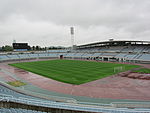South Korea 2022 FIFA World Cup bid

The Korea 2022 FIFA World Cup bid was the second official bid from the Korea Football Association or the KFA. If this bid was successful, Korea would have been hosting their second World Cup Finals and it would have been their first solo hosting since they shared the 2002 FIFA World Cup with other co-host Japan. Despite recent tensions, Han Sung-joo, chairman of the bid committee hoped to involve North Korea if South Korea received the bid.[1][2]
Schedule
| Date | Notes |
|---|---|
| 15 January 2009 | Applications formally invited |
| 2 February 2009 | Closing date for registering intention to bid |
| 16 March 2009 | Deadline to submit completed bid registration forms |
| 14 May 2010 | Deadline for submission of full details of bid |
| 22–25 July 2010 | Inspection committee visits Korea Republic[3] |
| 2 December 2010 | FIFA appoints Russia as hosts for 2018 and Qatar for 2022 World Cup. |
Candidate venues
| Seoul | Busan | Incheon | ||
|---|---|---|---|---|
| Seoul World Cup Stadium[a] | Olympic Stadium | Busan Asiad Main Stadium[a] | Incheon Munhak Stadium[a] | Incheon Asiad Main Stadium |
| FC Seoul | Multiple uses | Busan IPark | Incheon Korail | New Stadium |
| Capacity: 66,806 (plans to expand to 83,000) | Capacity: 69,950 | Capacity: 53,864 (plans to expand to 60,000) | Capacity: 49,084 | Capacity: 30,000 |
 |  |  |  |  |
| Daegu | Daejeon | Gwangju | Ulsan | Suwon |
| Daegu Stadium[a] | Daejeon World Cup Stadium[a] | Gwangju World Cup Stadium[a] | Ulsan Munsu Football Stadium[a] | Suwon World Cup Stadium[a] |
| Daegu FC | Daejeon Citizen | Gwangju FC | Ulsan Hyundai | Suwon Samsung Bluewings |
| Capacity: 66,422 (plans to expand to 81,422) | Capacity: 40,535 | Capacity: 44,118 (plans to expand to 45,245) | Capacity: 44,102 | Capacity: 43,959 |
 |  |  |  |  |
| Goyang | Jeonju | Cheonan | Seogwipo | |
| Goyang Stadium | Jeonju World Cup Stadium[a] | Cheonan Stadium | Jeju World Cup Stadium[a] | |
| Goyang Hi FC | Jeonbuk Hyundai Motors | Cheonan City FC | Jeju United | |
| Capacity: 41,311 | Capacity: 42,477 | Capacity: 26,000 (plans to expand to 45,000) | Capacity: 35,657 (plans to expand to 43,657) | |
 |  |  |  | |
- Notes
- ^ a b c d e f g h i j Stadium used in 2002 FIFA World Cup
Official Bid Partners
References
- ^ "Jong Tae-se is North Korea's answer to Wayne Rooney". Guardian. 2010-05-30. Retrieved 2010-05-29.
- ^ John Duerden: Korea itching to host 2022 World Cup. The Korea Herald. April 14, 2010. Retrieved June 21, 2010.
- ^ "FIFA receives bidding documents for 2018 and 2022 FIFA World Cups" (Press release). FIFA.com. 2010-05-14. Archived from the original on July 29, 2010. Retrieved 2010-07-31.
- v
- t
- e

- Australia
- Japan
- Qatar
- South Korea
- United States








